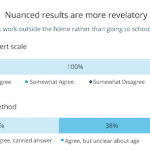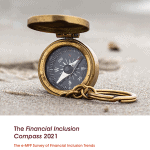Leveraging Big Data to Improve Mental Health After COVID-19: An Innovative Research Method Reveals Unmet Needs and Untapped Opportunities in Nigeria
The consequences of the COVID-19 pandemic have had a marked impact on the state of global mental health, which was already in decline prior to the start of the crisis in 2020. Disruptions to education, social activities, working environments and living situations mean that many will suffer long-term economic and emotional adversity. Alongside widespread chronic loneliness, the abundance of cases of psychological distress and trauma have skyrocketed, with nearly four in 10 adults in the U.S. reporting symptoms of depression or anxiety at the end of 2020, and the Centers for Disease Control and Prevention noting that overall rates of anxiety and depression were four times higher between April 2020 and August 2021 than they were in 2019.
But until now, research methods have lacked the richness of unprompted data from online conversations, which capture people’s real views and opinions on mental health issues in a way that conventional surveys or polls can’t always ascertain. Additionally, with much of this research focused on the Global North, the mental health challenges of countries outside of this region remain largely uncharted territory – and this includes the mental health crises sparked by the pandemic in regions like Africa.
For organisations looking to enter into African markets to provide solutions for these challenges, capturing real-time data on people’s reactions to local and global events in these regions can provide a significant return on investment. Given that the global wellness industry represented a $4.5 trillion market (as of 2018), and the mental health apps market is set to exceed $3.3 billion by 2027, there is significant market opportunity to scale digital social health tools to support global populations – all while delivering economic value to the countries that need these health tools the most.
In this article, we’ll unpack Ripple Research’s “active listening” approach to gathering social data – a model that leverages machine learning and natural language processing algorithms to collect and analyse data derived from millions of public conversations taking place across the world. We’ll explore how this data can help us understand the state of mental health in Nigeria, and discuss how our evaluation of millions of these conversations has revealed new intervention opportunities and priorities for social enterprises and investors.
Overcoming the Western-Centric Focus in Mental Health Research
The traditionally Western-centric focus of wellness and mental health research has continued during the pandemic. For example, relatively large data sets linking changes in mental health to coronavirus response measures in the U.K. and U.S. have sparked discussion, yet very little is known about the same issues as seen in an African context. This has made decision-making more arduous for mental health-focused businesses looking to enter markets in Africa and other regions across the Global South, because up until now, they have lacked contextual data on the current issues at play in these countries. This presents obstacles for social enterprises and investors in the health sector looking to provide and scale solutions – not only to current mental health challenges, but to the endemic problems facing the public health infrastructure across the continent, and in individual African countries.
Understanding the mental health trends at play is particularly salient in Nigeria, given that the country has the largest population in Africa (approximately 206 million people), and a reported one in four Nigerians suffer from some sort of mental illness. Studies have shown that approximately 80% of Nigerians with serious mental health needs are unable to access care. These figures are due in part to the lack of budget allocated to health care and mental health issues in the country. In 2006, just 3.3% of the central government’s health budget was directed to mental health, according to the last publicly available report on the mental health system in Nigeria issued by the WHO. More recently, the published 2021 budget allocated a portion of funds to mental health services, including the building of facilities and programme development. However, the President of the Association of Psychiatrists in Nigeria has criticised this funding as inadequate, since the country faces a treatment gap, defined as the number of serious cases receiving no treatment over the last 12 months, of up to 85% – far higher than the gap in more developed countries.
In addition to the lack of funding, cultural norms and religious beliefs have been cited as contributors to the stigma associated with psychological illnesses. The need for solutions to the country’s mental health challenges – including emerging issues related to climate change and COVID-related anxiety – has never been more urgent.
Using Social Data to Uncover the Regional Contexts of Mental Health Challenges
Working at the intersection of data science, behaviour change and social impact, Ripple Research has uncovered large-scale qualitative insights on mental health in Nigeria by using a machine learning model to detect, track and connect thousands of topics actively being discussed within the wellness industry. These conversations took place across news sites, forums, blogs and social media platforms such as Twitter. Our algorithms identified dominant categories in these online discussions, then our research team developed specific lexicons to unearth the relevant opinions, sentiments and emotions relating to the topic of mental health and wellbeing. The data we gather on these conversations always indicates related sub-topics that add further nuance. For example, alongside mental health, the data revealed tangential issues relating to social protection and poverty.
The data set was assembled from January 1 to August 15, 2021, and it revealed that various sub-topics of mental health and wellbeing garnered over 380,000 posts from 100,000 unique authors in Nigeria in that period. We were also able to trace the range of emotions and posts relating to trauma, stress, depression, re-opening anxiety, conventional anxiety and attention deficit/hyperactivity disorder. The majority of online conversations surrounding these issues took place on Twitter, where specific hashtags like #mentalhealth accrued over 20,000 tweets and over 82 million impressions over the eight-month period.
On the subject of mental health, social media acts as a clear resource for sharing details about helplines in Nigeria for those who may not be able to access clinics due to distance or financial constraints. We found that much of this online activity was led by popular Twitter accounts such as @aproko_doctor and @firstdoctorr, who have engaged audiences that are keen to share details about free, trained and licensed councilors available in the country. The following tweet is just one example:
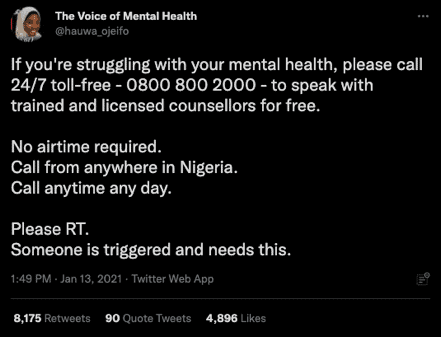
Sharing mental health resources on Twitter has generated a high level of traction and engagement, with thousands of retweets. This suggests that platforms such as Twitter serve as a valuable resource to capture and amplify conversations relating to mental illness.

Dominant mental health issues over time
The active engagement by users in the form of sharing and retweeting information about helplines also suggests that there is a lack of knowledge about how those in need of psychological support can access trusted mental health services. This represents an opportunity for businesses that are developing health platforms that could act as a central information hub and directory for practitioners.
Ripple Research’s data was also able to pinpoint specific events and triggers that caused increases in online mention volume surrounding mental health. For example, on February 13, 2021 there were over 5,400 posts and over 1,750 tweets relating to #lekkitollgate. This hashtag is a direct response to the Lekki Toll Gate Massacre that took place in Lagos on October 20, 2020. Here, the peaceful #EndSars protest, which demanded an end to brutality, extrajudicial executions and other abuses by the police force’s Special Anti-Robbery Squad (SARS), turned into a bloodbath, as many citizens were shot dead by the Nigerian army. The reprisal of this discussion online and the corresponding emotions indicate that this traumatic event incited further mental suffering, even months later. The impact of this event offers a plausible example as to why fear is the dominant emotion in Nigeria identified throughout our study, as illustrated in the tweet and the chart below.

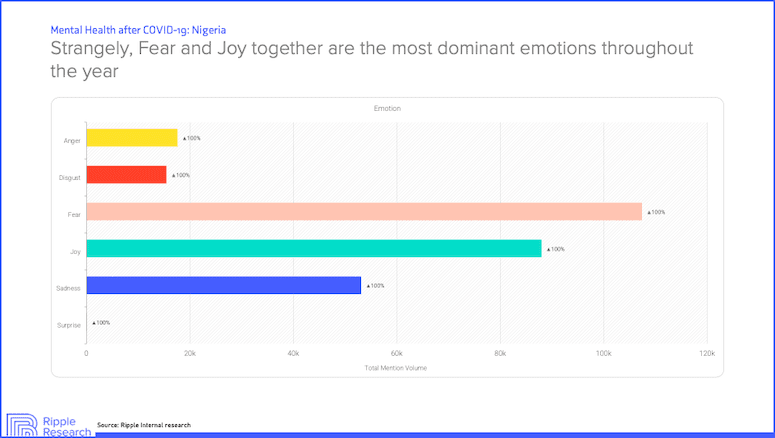
Emotions analysis in online conversations
In Conversations About Mental Health, Timing is Everything
To understand the weekly cycles and recurring themes in mental health conversations in Nigeria, it was important to conduct a deep dive into the scheduling and timing of conversations related to various psychological disorders. We found that specific days of the week were tied to particular emotions. Trauma was contemplated online most on Sundays, while mention volumes for depression, anxiety and suicide were higher mid-week on Wednesdays.
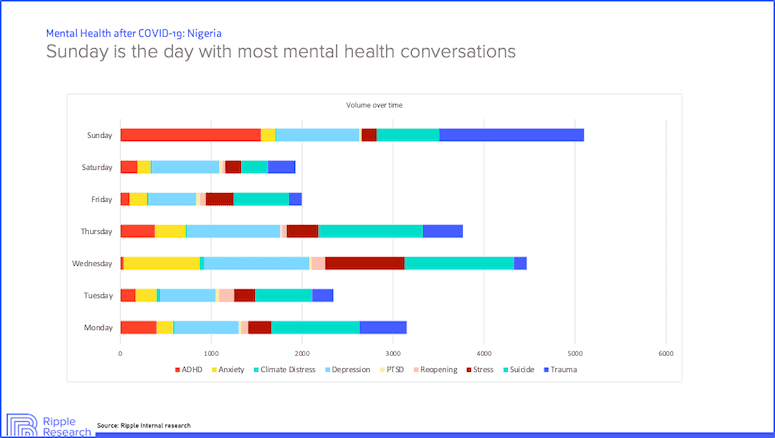
Specific mental health issues broken down by day of the week
These valuable takeaways could help developers of digital medical tools to refine their user interfaces and activity, in order to provide additional services during peak demand periods and to tailor their messaging accordingly.
Our team also assessed the popularity of digital tools, to ascertain which apps and programmes are currently generating the most posts. Among the active Nigerian online community, the most-mentioned resource was Happify, an application that provides tools and programmes to help users manage their mental health. Our findings below indicate there is still space for further penetration of other apps, such as Headspace, Calm and Talkspace, in this market segment – or even local solutions to address local problems with a deep understanding of the context, culture and environment.

Conversation volume for health apps broken down by month
These findings about Nigerians’ interest in mental health management tools contrast with the findings from our case study on Wellness in the U.S.A., which evaluated over 4 million online conversations and found that the most popular apps were Calm and Talkspace, with significantly fewer mentions of Happify. Conversations about mindfulness and meditation were also markedly more popular in the U.S. than in Nigeria, receiving over 3.4 million posts over the period of January to March 2021. For global businesses and social enterprises operating in this sector, it will be fundamental to understand regional nuances like this, in order to develop country- and region-specific health programmes that tie in with cultural norms.
Intervention Opportunities for Health Providers, Social Enterprises and Investors
How can businesses use these research insights to inform their strategies? In Nigeria, a nation with chronically underfunded mental health services and resources, there are boundless opportunities for organisations to tackle these issues and work alongside governments to rebuild the current health infrastructure.
For instance, leveraging this data from Ripple Research, there is a clear demand for accessible, free or cost-effective platforms that provide information about how to connect with trained mental health professionals. To overcome hurdles related to poor awareness of mental health issues, and to destigmatise psychological illnesses in the country, professional services and human resource groups could develop and sell programmes designed to educate their employees. This could exist in the form of freemium or subscription-based services for their clients.
For companies that offer the sorts of apps and digital tools that have resonated with the Nigerian community, like Happify, another key recommendation is to align their strategies to our findings on the timing and weekly cycles of discussion of different mental health challenges. Given that some days of the week are more prevalent for specific conversations – like Wednesday for the topic of suicide – these companies can create targeted content designed to meet expected surges in demand for helplines, counselling and therapy on these issues. These platforms would also benefit immensely from Ripple Research’s data when developing new programmes to address the evolving implications surrounding climate and post-COVID re-opening anxiety.
At a macro level, investments in digitally enhanced health-care delivery would be welcome – not only from the government, but from the private and development sectors as well. This includes the provision of basic computer equipment in rural communities to enhance connectivity, so that those in remote towns and villages can access therapy sessions and other resources online. This would also enable them to join important conversations hosted by organisations like Nigeria Health Watch and Mentally Aware Nigeria Initiative.
Lastly, it is clear that to tackle the country’s unprecedented mental health challenges, all stakeholder groups must go beyond traditional survey data and polling results to look deeper at unprompted data, and to focus on active listening. For Nigeria, a country whose mental health challenges have been described as a global human rights emergency, this means applying insights about current trends and triggers to design meaningful intervention strategies that increase the accessibility of services which can reduce the burden of psychological disorders.
Ravi Sreenath is Managing Director and Co-Founder, and Amy Nguyen is Head of Strategic Partnerships and Content, at Ripple Research.
Photo: Protesters in Nigeria. Image credit: Ripple Research.
- Categories
- Coronavirus, Health Care, Social Enterprise, Technology
